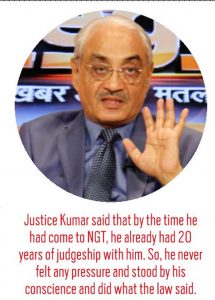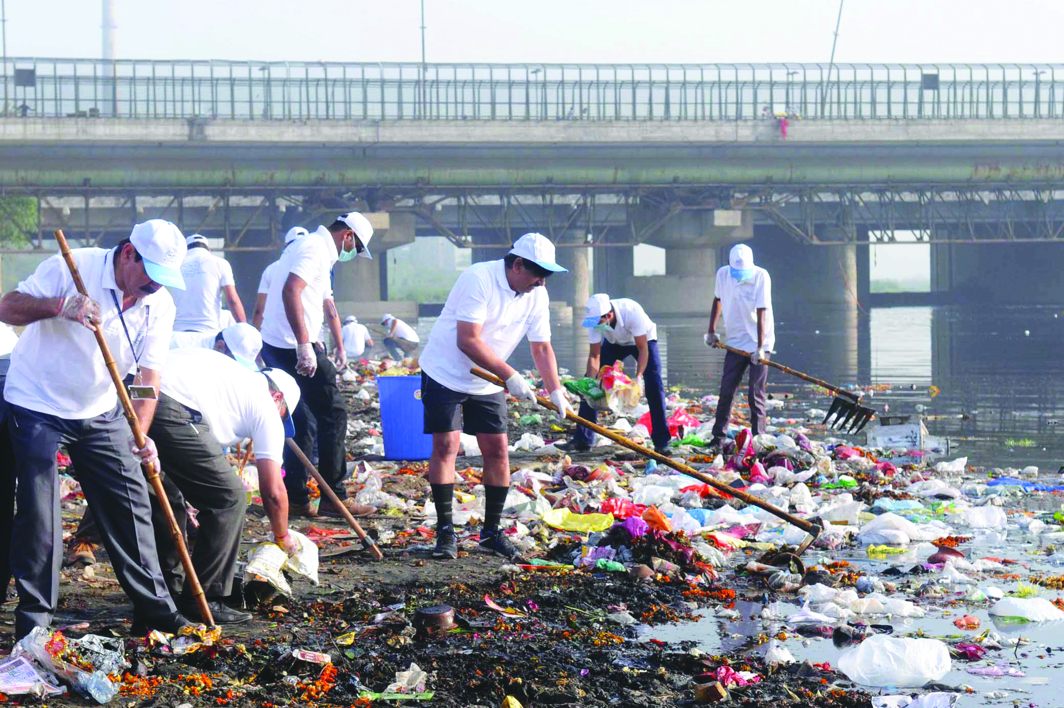Above: Justice Swatanter Kumar (centre) flanked by Pradeep Rai, senior advocate, Supreme Court (third from left); Rajshri Rai, editor-in-chief, APN (third from right); Inderjit Badhwar, editor-in-chief, India Legal (second from right), Shobha John, deputy managing editor, India Legal (first from right); Ashok Damodaran, executive editor, India Legal (second from left) and Puneet Nicholas Yadav, deputy editor, India Legal
The National Green Tribunal which was hyperactive during Justice Swatanter Kumar’s tenure is headless now and there are no signs of the government showing any urgency to fill up vacancies
~By Lilly Paul
The delay in filling up pending vacancies, both judicial and expert members, in the National Green Tribunal (NGT) is affecting its work, former chairman of the panel Justice Swatanter Kumar stated. Appearing on the India Legal Show, his first ever interaction with any media entity since he stepped down as the NGT chief in December last year, Justice Kumar answered questions on a wide array of subjects ranging from his long career that included stints as a judge of the Delhi, Punjab and Haryana and Himachal high courts, the chief justice of the Bombay High Court and a judge of the Supreme court to his most recent one as head of the NGT.
Replying to a question by Senior Advocate, Supreme Court, Pradeep Rai on vacancies being left unfilled in the NGT, Justice Kumar said that filling up posts in NGT is a continuing process but admitted that he had not kept track of the developments after his retirement.
The green watchdog was founded in 2010 to protect the environment and keep a check on pollution. Justice Ku-mar took over as chairperson in December 20, 2012, and for the next five years, he was at its helm, leaving an indelible mark by handing down several path-breaking judgments. After his retirement, the NGT functions with an acting chief and the centre has shown no urgency in filling up the many vacancies at the top and in zonal benches. Consequently, litigants are put to much hardship. Rai’s question centred around a general perception that in the absence of a chairman, the NGT, which had been hyperactive for the last five years, is showing signs of floundering.
Among the remarkable judgments that Justice Kumar delivered are the ban on old vehicles in Delhi, the fine of Rs 5 crore imposed on spiritual guru Sri Sri Ravi Shankar for causing damage to the Yamuna floodplains, ban on plastic bags, putting a daily cap on pilgrims to Vaishno Devi and restricting traffic to the Rohtang Pass.
Describing his role in NGT, Justice Kumar said it was very distinct from the rest of the responsibilities he had handled, although he had 20 years of judgeship prior to joining the Tribunal. He said that the one sense of satisfaction with which he left office was that the green court was successful in raising public consciousness and awareness about environment.
Although the apex court and the high courts had passed several serious orders for protecting the environment, it was the NGT which had played a guiding role in environment conservation. He counts it as one NGT’s primary achievements—it could make different sections of society such as the government, industrialists, working class and even school children conscious about protecting the environment. Justice Kumar said that people may at times find NGT’s orders inconvenient but what is important is that those judgments could trigger a debate.
 Justice Kumar highlighted the fact that environment is a social subject and therefore a collective effort is needed to preserve it. He said that the society should think that it needs clean air and water but at the same time the government should not shift its responsibilities and these matters should reach the court at last.
Justice Kumar highlighted the fact that environment is a social subject and therefore a collective effort is needed to preserve it. He said that the society should think that it needs clean air and water but at the same time the government should not shift its responsibilities and these matters should reach the court at last.
Rajshri Rai, editor-in-chief of APN (India Legal ’s sister concern) and the host of the show, asked Justice Kumar about the many pressures that he may have been subjected to from various lobbies. To which he replied: “See, by the time I came to NGT, I already had 20 years of judgeship with me. So I never felt a pressure. I stood by my conscience and what the law demanded. I didn’t care who thinks what… how can you bother about what people will think, what people want, what parties want. There were many lobbies before NGT, be it the welders’ lobby, mining lobby, forest lobby, development lobby, people who were destroying the wetlands, protected lands on the seas; you knew that they were people with strengths. And, I think it is the duty of the judge to withstand the strengths.”
Inderjit Badhwar, editor-in-chief of India Legal magazine, asked him about the ongoing tussle in the judiciary, to which Justice Kumar replied that a chief justice should ensure that all the judges are taken along as they represent an institution. “I was the chief justice of the Bombay High Court. I found no difficulty to run that court. I was able to do a lot of infrastructure work, judicial dispensation increased and all the judges deserve compliments.”
When the NGT was founded, the narrative prevalent was of development versus conservation. But over the years, it seems that subsequent governments have felt that it has been vested with too many powers and there have been constant attempts to weaken the Tribunal such as taking away certain powers, not appointing people, so on and so forth.
Justice Kumar was of the opinion that the NGT is only one of its kind in the world as environmental courts in other countries are vested with a few regulatory powers while this Tribunal has sweeping powers including the power to take punitive action.
One question put to Justice Kumar was that though NGT orders passed were strong in themselves, they were hardly implemented. An example cited was the Art Of Living order, wherein the spiritual guru Sri Sri Ravi Shankar had gone to the extent of saying that he will not pay the fine imposed, implying that a court order was being wilfully defied.
Justice Kumar, however, said that the the organisation had to and did pay the fine. He repeated his stance that execution all over the world is a problem but people have started realising that efforts should be made by them. However, he also said that “change” would not be a correct word to use as it would connote a total alteration, a stage to which “we haven’t reached. Rather, it would be appropriate to say that there have been variation in the attitude of people.”
Justice Kumar was asked about NGT’s decision to ban decade-old diesel vehicles and 15-year-old petrol vehicles in Delhi-NCR. Even if the NGT’s order was aimed at solving the environmental crisis in Delhi-NCR, it created a new problem of disposal of those banned vehicles. Even if they were to be sold, they would create pollution in the place they are sold in. Justice Kumar said that the solution to the problem was already given in the judgment itself, which unfortunately had gone unnoticed as people usually fail to interpret the judgment in its entirety.
Justice Kumar explained that the judgment clearly states that an air quality analysis needs to be done of the area in which these vehicles will operate outside Delhi-NCR. The density of cars in that area also needs to be determined, he said. If both the things are within the permitted scale of pollution, then the vehicle should be sold in that place, otherwise not, he clarified.
Referring to cars that will be disposed off, he said that the NGT had clearly said that it will be done only after providing incentives to owners and the scrap must be recycled.
Speaking about the odd-even rule introduced briefly in Delhi sometime back, Justice Kumar said that he was of the personal opinion that the scheme was ineffective. Rather, he had suggested a much better alternative—to provide direct point-to-point bus services from colonies such as Dwarka and Rohini, where the majority of people are office-goers and therefore they will be happy to travel in an economical, fast and more convenient way.

Justice Kumar was asked about his opinion on the river linking project being contemplated by the government, given that there was a scientific view that it could lead to ecological degradation. “There is a judgment of the Supreme Court permitting interlinking of rivers. That was done after three different, highly-placed technocrats and academicians from the field of hydrology and other connected sciences said that there were consistent reports that interlinking of rivers was one of the major steps that can be taken to prevent droughts on the one hand and floods on the other. However, despite the judgment, there should be a proper study and all precautions should be taken as possible.”
Another question put before Justice Kumar was the problem of illegal construction which he dealt with during his tenure in the Himachal Pradesh High Court and the current Delhi sealing drive, and the problem of practical implementation associated with such judgments. Justice Kumar responded by giving an example of the unfortunate incident that happened in Kasauli recently where a lady officer who went for demolition of an illegal construction was shot dead.
“In Kasauli, there was a person who was permitted to build three rooms and he raised a five-storey hotel. He has no system for disposal of municipal solid waste, sewage, no pollution devices, no source of water. If you are asking about demolition of that particular construction, then I do not think law should worry about it. Because if you do not check it now, it will have three repercussions—people will take law for granted; damage to the nature and natural resources will be irreparable and thirdly, you are risking the life of others. If you have invested in violating the law, then you very well face the consequences,” said Justice Kumar.
When asked which of his judgments satisfied him the most, Justice Kumar said: “I will give preference to Yamuna and Ganga. As a very ordinary citizen of this country, I can say that the Ganga can be cleaned and the issue is definitely resolvable. Ganga can be cleaned and it must be cleaned.”


